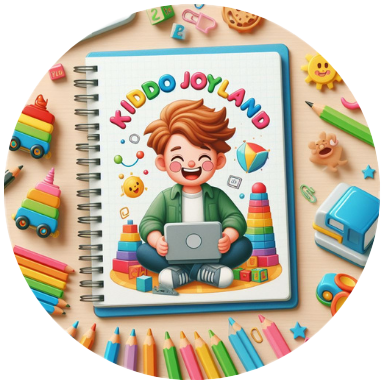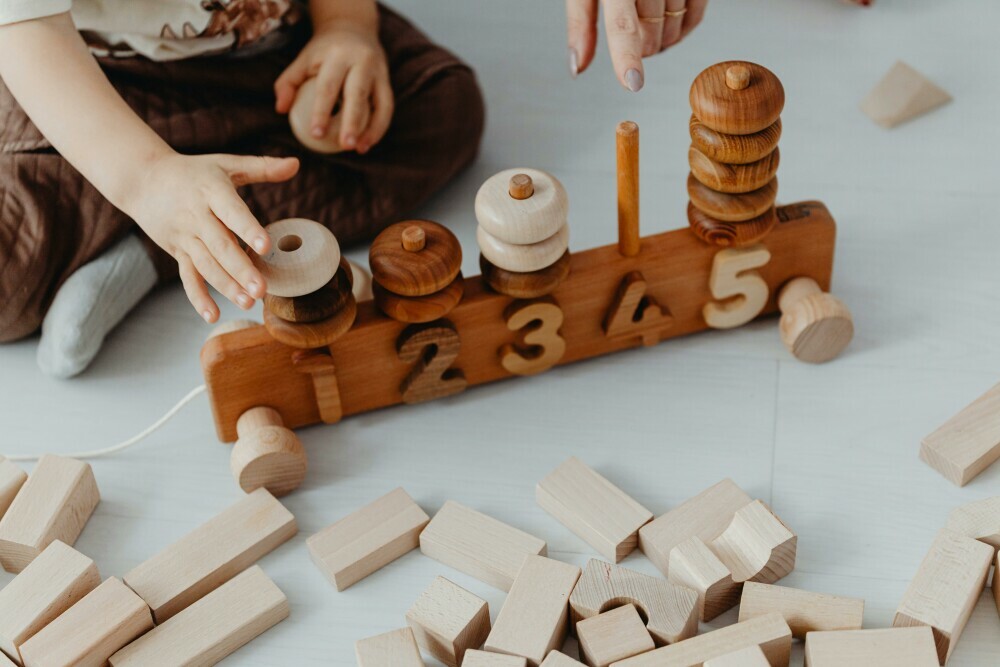Are you searching for enjoyable, interactive methods to support your child’s learning and skill development? Educational toys for children are the perfect solution for parents. These creative playthings provide entertainment and have immense advantages for your child’s progress and growth.
In this blog post, I will share how and why learning educational toys for children is vital to their development, their advantages, tips for selecting the most suitable ones for various age ranges, and more.
Why Are Educational Toys Essential for Children’s Development?
Children’s development is a complex and crucial process involving various aspects of growth and learning. Through my siblings and their children, I learned that educational toys play a significant role in supporting this development by providing fun and interactive ways for children to explore, experiment, and learn.
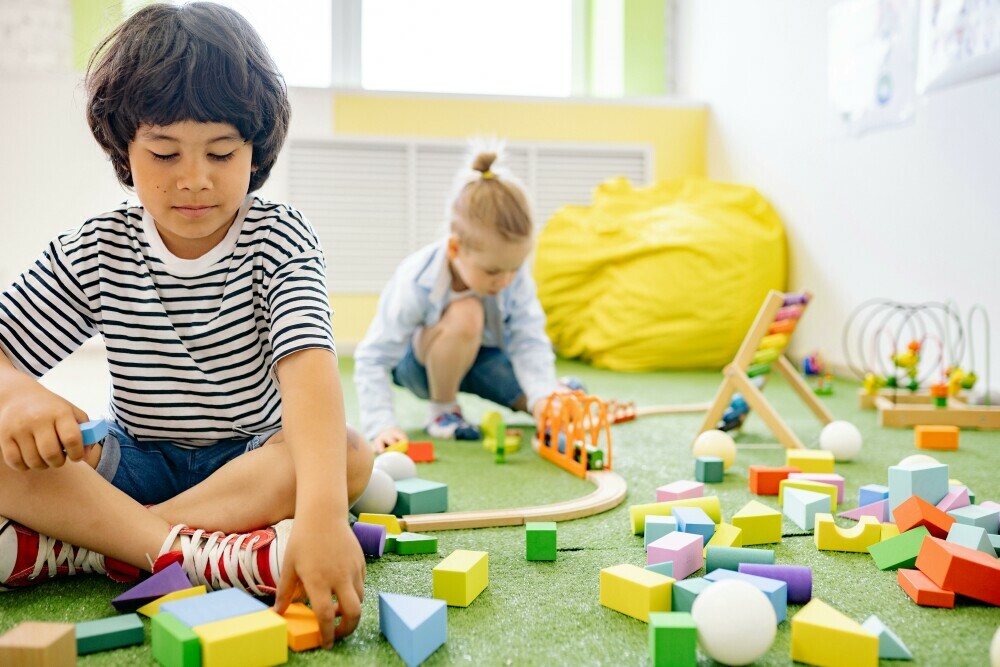
The reasons are:
- Promotes Learning and Development: Educational toys stimulate a child’s cognitive, physical, social, and emotional development. They help children learn new skills and concepts, such as problem-solving, critical thinking, motor skills, language development, and more.
- Hands-On Learning Experience: Educational toys provide hands-on learning experiences that allow children to engage with the toy and learn through play actively. This type of interactive learning is crucial for a child’s development as it helps them retain information better.
- Enhances Creativity and Imagination: Many educational toys are open-ended, encouraging children to use their imagination and creativity to develop different ways to play with them. This promotes creative thinking skills in children from a young age.
- Builds Important Skills: Educational toys target specific developmental areas, such as fine motor skills or hand-eye coordination. Children can improve these skills by playing with these toys while having fun.
- Encourages Problem-Solving Skills: Educational toys often challenge children to overcome through trial and error or logical thinking. This encourages problem-solving skills in children and helps them develop resilience when faced with difficulties.
- Fosters socialization: Many educational toys can be played in groups, promoting teamwork, communication, and cooperation skills. This is an essential aspect of a child’s social development and prepares them for future peer interactions.
- Builds self-confidence and keeps them engaged: As children play with educational toys and master new skills, they gain a sense of accomplishment and build self-confidence. This positive reinforcement encourages children to continue learning and exploring. Educational toys are designed to be fun and engaging, making learning enjoyable for children. Children having fun are more likely to stay focused and engaged, leading to better retention of information.
Educational toys for children offer numerous benefits. They promote learning, enhance creativity, build essential skills, foster socialization, and boost confidence.
These toys stimulate cognitive, problem-solving, creativity, and fine motor skills. They also help develop social skills and foster curiosity and exploration, supporting holistic development that benefits children through enjoyable play.
Benefits of Learning through Play with Educational Toys for Children
Children play with educational toys, have fun, and develop essential skills. These toys provide a hands-on learning experience that sparks creativity and imagination.
Suggested Reading: The Ultimate Guide to Choosing The Right Toys for Your Child
Children can enhance their problem-solving abilities through play by figuring out how things work and experimenting with different solutions.
The Benefits are:
- Development of Motor Skills: Educational toys often involve physical activity, which helps children develop their fine and gross motor skills. Building blocks, puzzles, and drawing can improve hand-eye coordination and dexterity.
- Enhances Cognitive Development: Educational toys can also aid in developing cognitive skills such as memory, attention span, and critical thinking. Playing with educational toys requires children to think and make decisions, helping them to develop problem-solving abilities.
- Encourages Creativity and Imagination: Children who engage in open-ended play with educational toys are encouraged to use their imagination and think creatively. This type of play allows them to explore different possibilities and develop unique solutions.
- Improves Social Skills: Educational toys that require cooperation or teamwork can help children learn how to interact with others effectively. They learn essential social skills such as communication, sharing, and taking turns.
- Promotes Language Development: Many educational toys incorporate language-building activities such as storytelling or role-playing. These activities can improve young children’s vocabulary, sentence structure, and fluency.
- Develops Emotional Intelligence: Children can learn how to express their emotions safely and positively through play. Educational toys that focus on emotions
Indeed, learning through play with educational toys offers numerous benefits for children. It helps develop motor and cognitive skills, encourages creativity and imagination, improves social skills and language development, and promotes emotional intelligence.
These toys make learning fun and engaging for children, helping them to grow and develop in a well-rounded manner. In addition, they lay a strong foundation for lifelong learning and skill development in children of all ages.
The following section offers the best way to evaluate toys, focusing on age groups that match their stage of development.
Evaluating the Best Educational Toys for Different Age Groups
When selecting educational toys for children, considering their age is essential. Different age groups have varying developmental needs and interests that should be catered to with suitable toys.
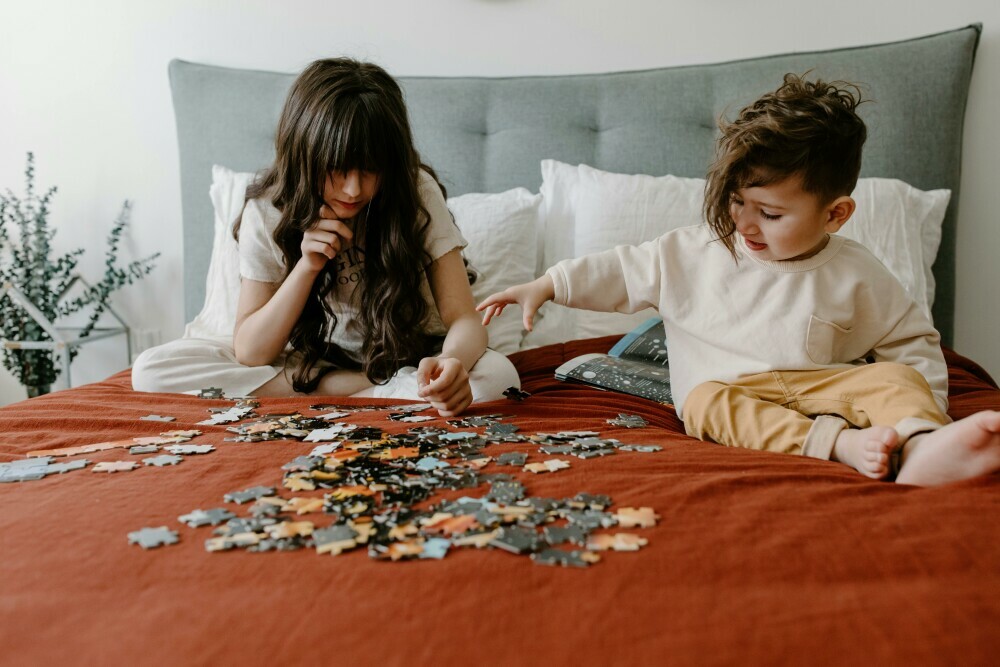
It is important to note that every child develops at their own pace and may have varying interests within their age group. As a result, parents need to observe their child’s individual needs and preferences when selecting educational toys for them.
Suggested Readings: Educational Toys Make Learning Fun For Infants
- For infants and toddlers, soft plush toys with different textures can help stimulate their touch, movement, and manipulation using sensory development. Toys that make sounds or music can also capture their attention and encourage auditory skills.
- Preschoolers benefit from puzzles, building blocks, or shape sorters that enhance problem-solving abilities and fine motor skills. Interactive games that involve counting or simple math concepts are great for introducing early numeracy skills.
- For elementary-aged children: Educational toys that encourage creativity and imagination, such as art supplies, building sets, or science kits, are beneficial. Educational board games can also help develop critical thinking and social skills.
- As children enter their teenage years, Educational toys can focus more on specific interests and skills. STEM (science, technology, engineering, and math) kits are great for fostering an interest in these subjects. Books and puzzles that challenge their problem-solving abilities are also excellent choices.
As children enter their teenage years, educational toys can focus more on specific interests and skills. STEM (science, technology, engineering, and math) kits are great for fostering an interest in these subjects.
Books and puzzles that challenge their problem-solving abilities are also excellent choices. It is important to note that every child develops at their own pace and may have varying interests within their age group.
Consequently, parents need to observe their children’s needs and preferences when selecting educational toys. The following sections discuss how parents work with educational toys for children who need adaptation.
Educational Toys for Physically Challenged Children
Every child deserves to learn and grow through play, regardless of physical challenges. I explore some of the top educational toys designed to support their development and provide tips for parents and caregivers on making the most of these valuable tools.
These toys aid learning and provide entertainment, making learning more enjoyable and interactive. Therefore, they play a crucial role in promoting children’s development by nurturing their minds and skills through play.
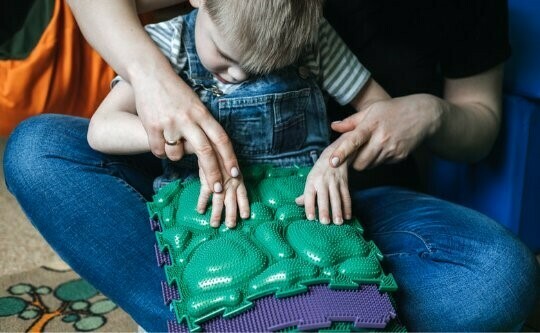
Here are the top 5 educational toys that can help enhance learning and development for these kids:
- Adapted Musical Instruments: Music is a universal language, and adapted musical instruments allow children with physical challenges to explore their creativity through sound.
- Sensory Play Kits: These kits come in various textures, shapes, and sizes, providing sensory stimulation for children with different abilities.
- Tactile Puzzles: Tactile puzzles offer a hands-on approach to problem-solving and critical thinking skills while engaging children in a fun way.
- Switch-Adapted Toys: These toys are modified with switches that make them accessible for children with limited mobility or dexterity.
- Interactive Storybooks: Interactive storybooks incorporate touch, sound, and visuals to create an immersive reading experience for all children with different physical challenges.
Parents and caregivers are crucial in creating an enriching learning environment when choosing educational toys for physically challenged children.
Here are some recommended tips to make the most out of using these unique toys.
- Always consider the child’s specific needs and abilities when selecting educational toys. Tailoring the toys to match their interests and challenges can enhance their engagement and development.
- Encourage hands-on exploration and experimentation with the educational toys. This interactive approach can help children learn through play while improving their motor and cognitive abilities.
- Be sure to provide encouragement, guidance, and support as needed during playtime. Helping boosts the child’s confidence and ensures a positive learning experience with the educational toys.
- If necessary, be flexible in adapting or modifying educational toys to the child’s preferences. Customizing the toys can make them more accessible and enjoyable for physically challenged children. Patience is critical when using educational toys with physically challenged children. Allow them time to explore, learn at their own pace, and celebrate every small achievement.
Educational toys are vital for the growth and development of physically challenged children. They offer enjoyment and academic benefits, improving their cognitive, motor, and social skills.
Parents and caregivers must select appropriate toys that align with each child’s unique needs and abilities. This involves considering age-appropriateness, safety, and stimulation for optimal development. The following section discusses how parents can encourage educational learning with their children.
The Role of Parents in Encouraging Learning with Toys
Parents play a crucial role in encouraging learning through educational toys for children. Parents can enhance the academic benefits of these toys by actively engaging with their kids during playtime.
Showing enthusiasm and interest in the activities helps create a positive learning environment where children feel motivated to explore and learn.
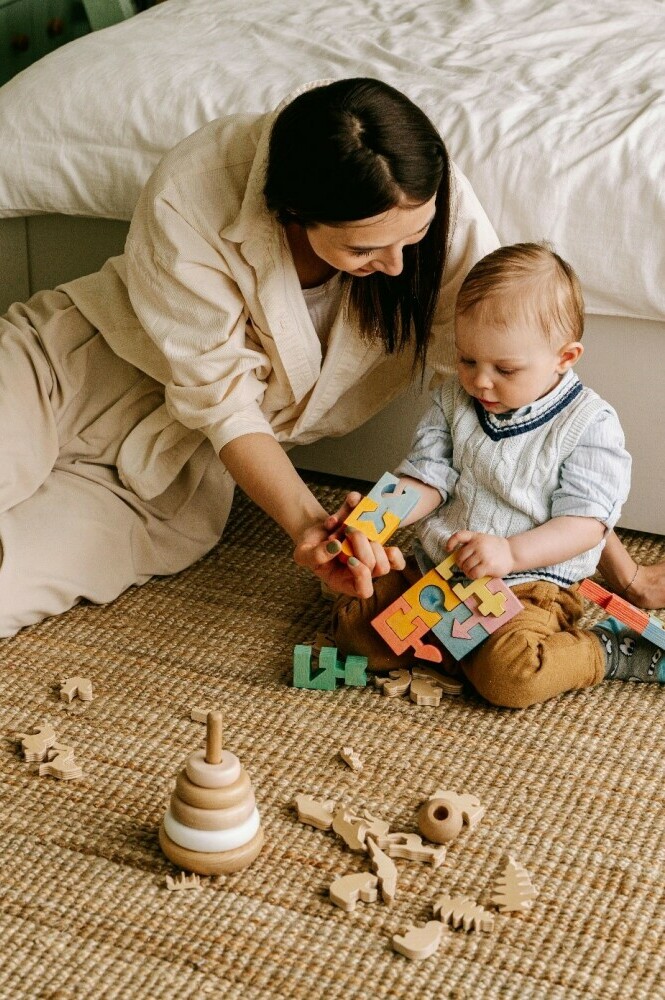
Parents can also guide their children to use the toys effectively, sparking curiosity and promoting problem-solving skills. Providing encouragement and praise when kids complete tasks or challenges with the toys boosts their confidence and self-esteem.
Parents can foster children by going through the following steps:
Step 1: Introduce age-appropriate toys. Parents should choose toys suitable for their child’s age and development level. This will ensure that the child is not overwhelmed or bored with the toy, allowing them to engage in meaningful play.
Step 2: Set up a designated play area. It is vital to have a dedicated space for playing with educational toys. This can be a corner of the room or a specific table where the child can focus on learning activities without distractions.
Step 3: Join in on playtime: Children learn by imitating and observing their parents. When parents actively participate in playtime, they can model how to use the toys and guide their children through different activities.
Step 4: Encourage open-ended play: Educational toys often come with instructions or suggested activities, but it is also important to let children explore freely without strict guidelines. This allows them to be creative and develop their problem-solving skills.
Step 5: Ask questions: Parents can ask open-ended questions to prompt critical thinking and encourage children to explain their thought processes while playing with the toy.
Parents can encourage learning with toys by actively participating in their child’s playtime. A supportive and encouraging environment allows children to develop essential skills and knowledge while having fun with educational toys and helping them with creativity skills.
Maximizing the Learning Experience with Educational Toys
When it comes to maximizing the learning experience with educational toys, it’s all about fostering creativity and critical thinking in children. Encouraging open-ended play allows kids to explore, experiment, and problem-solve on their own terms. By providing a variety of educational toys that cater to different interests and skills, parents can create a stimulating environment for their children to thrive.
To do this effectively:
- Choose age-appropriate toys: Educational toys are designed to be engaging and challenging but should also be suitable for your child’s age and developmental stage. This will ensure that the toy is not too difficult or too easy, allowing your child to learn at their own pace.
- Offer a variety of toys: Children have different interests and learning styles. By offering a variety of educational toys, you can cater to various skills and keep your child engaged. For example, if your child enjoys building, provide them with blocks, puzzles, and other construction toys.
- Encourage open-ended play: Open-ended toys can be played with in multiple ways without specific instructions or rules. These toys allow children to use their imagination and creativity while developing problem-solving skills.
- Limit screen time: While technology can offer some educational benefits for children, it’s essential to limit screen time and encourage hands-on play with traditional educational toys. This will help develop fine motor skills and social interaction.
- Join in on the fun: Children learn best through play when they have a positive role model to interact with. Take the time to join in on the fun with your child by playing with them or providing guidance when needed.
These list insights can guide you in selecting future educational toys that will continue to challenge and inspire them. Setting aside dedicated playtime where distractions are minimized can enhance the learning experience even further.
Engaging with your child during play sessions strengthens your bond and provides opportunities for guidance and support as they navigate through age-appropriate learning activities with their toys.
Tips for Choosing the Right Age-Appropriate Educational Toys for Your Children
When selecting age-appropriate educational toys for your children, consider their interests and developmental stage. For younger kids, choose toys that stimulate their senses and promote motor skills development, such as colorful rattles or textured blocks.
Always choose safe and durable toys for your child’s age. Avoid small parts that could be a choking hazard for younger children, and use sturdy materials for rough play.
Toddlers benefit from toys that encourage imaginative play, like dolls or toy vehicles. For preschoolers, look for toys that foster cognitive and social development, such as puzzles or board games. As children grow older, consider using toys that promote problem-solving skills, like building sets or science kits.
Here are some additional tips to help you choose the right age-appropriate educational toys:
- Read the age recommendation on the toy packaging: Most toy manufacturers provide an age range to guide parents in selecting appropriate toys for their children. Follow these guidelines to ensure your child’s safety and enjoyment.
- Consider your child’s interests: Children learn best when engaged and interested in what they are playing with. When choosing educational toys, consider your child’s interests and hobbies.
- Look for open-ended toys: Toys that can be used in multiple ways encourage creativity and imagination in children. Building blocks, art supplies, and pretend play items like dress-up costumes are great examples of open-ended toys.
- Check for educational value: While all toys have educational value, some are designed to teach children different skills. Look for toys that promote learning, like fine motor skills, problem-solving, language development, and social-emotional skills.
- The longevity of the toy: Some toys can only be used briefly due to their limited play value. Instead, look for toys your child can grow with and enjoy as they age.
When choosing toys, involve your child in decision-making and consider their interests and developmental stage. Educational toys should be fun and promote essential skills such as problem-solving and social interaction. Evaluate your child’s preferences and strengths to make learning engaging and enjoyable!
Final Thoughts
Educational toys are essential for children’s development. Choose age-appropriate toys that match your child’s interests and encourage the skills you want them to develop.
Let your child explore and play freely to make learning fun. As parents, observe how your child interacts with toys and adjust accordingly to maximize their learning experience.
Learning through play acquires knowledge and builds confidence, problem-solving skills, and social interactions. Therefore, when shopping for toys, consider the educational value they can bring to your child’s growth and development.
Invest in quality educational toys today and watch your child thrive in a world of endless possibilities.
